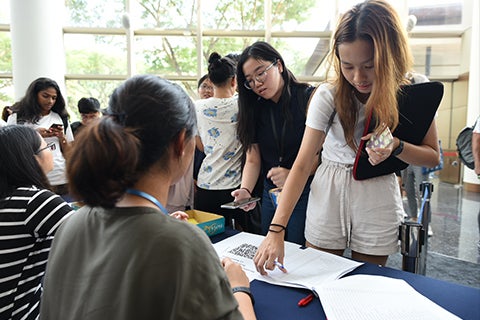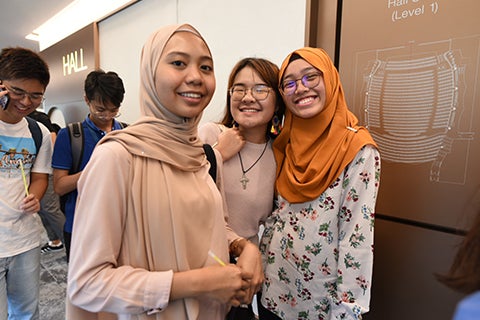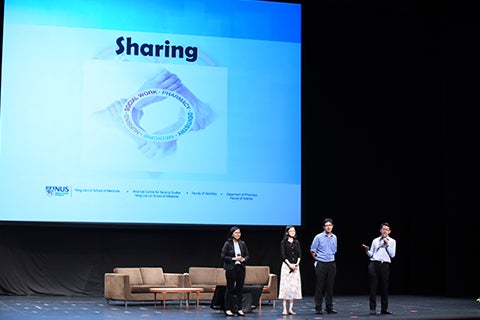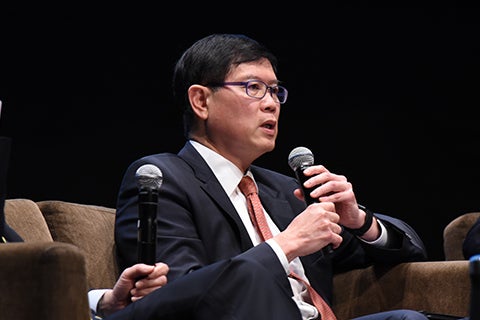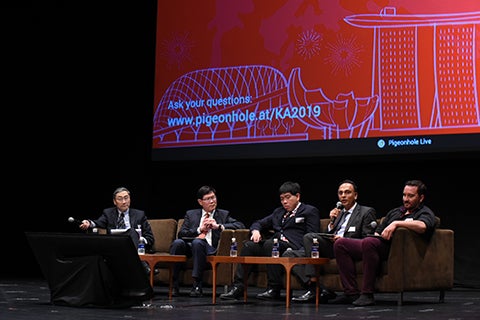Welcoming the future of Singapore’s healthcare
Published: 14 Aug 2019
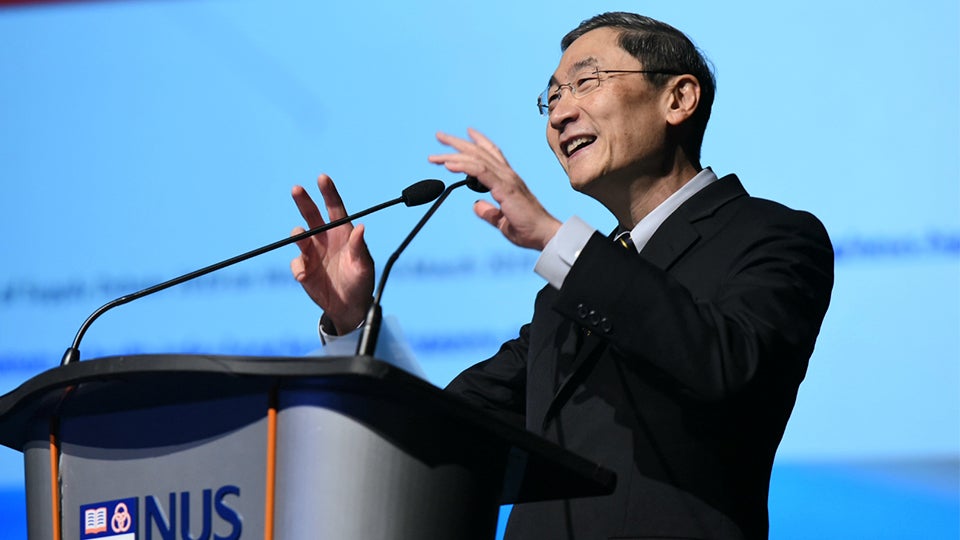
At the inaugural Healthcare Mass Induction 2019, we formally welcomed the latest batch of healthcare students from not only the Yong Loo Lin School of Medicine, but also our nursing students from the Alice Lee Centre for Nursing Studies, and students from NUS Pharmacy and NUS Dentistry.
As part of the induction, the students gathered for our annual Keynote Address to get to know one another and dialogue with healthcare leaders on the complexities and opportunities of an ever-evolving healthcare landscape.
Challenges Ahead
Addressing the future healthcare providers, Professor Chong Yap Seng, Dean of NUS Medicine noted that current healthcare students would have to battle a silver tsunami in Singapore, where the life expectancy has increased to 84 years since 2017; while keeping up with the increasing prevalence of chronic diseases such as diabetes, cardiovascular diseases and high blood pressure when they become part of the healthcare community upon graduation.
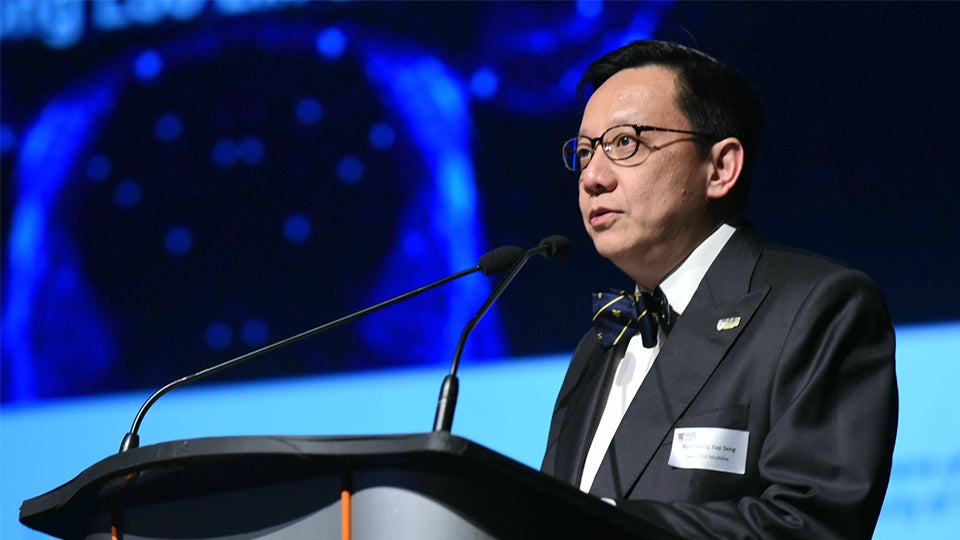
Besides employing traditional modes of care and prevention, healthcare organisations are now turning to real data and technology, in the form of smart devices and Artificial Intelligence (AI) to nip these conditions in the bud.
Prof Chong questioned the Year 1 students, “How are you going to use data and technology to disrupt the status quo in healthcare in your respective fields? How can you use what you have learnt in school to contribute to the health and welfare of the Singapore population, the region, and the world?”
The Impact of Technology and Digitalisation
How technology and digitalisation would impact Singapore’s healthcare landscape was discussed further by the Guest-of-Honour of the Keynote Address, Associate Professor Benjamin Ong, Director of Medical Services from the Ministry of Health (MOH), as well as the other panellists at the event.
“In reality, challenges are already upon us, and will get more acute moving forward if we do not start to adjust,” said Assoc Prof Ong.
He similarly outlined the challenges ahead, such as a rapidly ageing population, the shrinking of the local labour force, an increased demand for institutional care and the increasingly unsustainable cost of today’s predominantly hospital rescue model of healthcare.
Providing solutions to the challenges outlined, Assoc Prof Ong noted that we need to ensure that the healthcare manpower is equipped with the relevant skills and competencies required. Healthcare professionals would need to make use of technological tools and at the same time, must ensure that such implementation and choices would make healthcare more efficient and cost effective.
He shared that there has been an unrealised benefit of technology, digitalisation and AI in the healthcare industry.
“Why has technology not disrupted our existing ways of ‘doing’ healthcare? How has it not been making healthcare delivery more accessible and efficient?” he asked. Assoc Prof Ong noted, however, that this is certainly not from an unwillingness to adopt technology, digitalisation and advanced therapies.
How should we view technology and digitalisation? As in all things, we will need to know how to use them so that we judiciously and effectively incorporate these tools into our work, or replace work.
Technology and Digitalisation – A Double-edged Sword
The digitalisation of medical data opens up new possibilities for care. For instance, healthcare providers will be better able to personalise care based on the needs of the patient; and increase practitioners’ ability to make more precise and informed interventions and diagnoses in a timely manner. Likewise, for patients, the availability of such information empowers them to take charge of their own health.
The combination of both technological tools and digital data could open up new avenues for improvements in healthcare.
However, Assoc Prof Ong also cautioned that technology, digitalisation and advanced therapies will need to be used discerningly.
“We need to be mindful of the value proposition of such advanced and new treatment modalities.”
– Assoc Prof Benjamin Ong
Electronic medical data can be hacked, precision Medicine can turn out to be costly, and we lack information about the long term effects of many emerging cell and tissue therapies.
The Empathy of the Heart
“For all the advances we have made and will make, we cannot yet replace the human connection and care. The healthcare sector and healthcare professionals need to build trusting relationships with their patients in order to deliver high quality care.”
Assoc Prof Ong stressed that this is even more crucial as we seek to shift the centre of gravity of our healthcare system into health promotion, care in the community and the use of cost-effective care options.
Today’s artificial intelligence revolution, with data analytics and machine learning, promises to augment our cognitive abilities and redirect our energies towards what makes us uniquely human: our ability to empathise.
“The nature of work shifts from the toil of the muscles, to the reasoning of the brain, and now, to the empathy of the heart.”
– Assoc Prof Benjamin Ong
He concluded his address by noting that Singapore’s ageing population can be a blessing if it is managed well, allowing Singaporeans to lead longer, more productive and happier lives.
Assoc Prof Ong pointed out, “To meet this challenge (of an ageing population), we will need to view our future evolving roles, specialties and opportunities to serve differently. We will need to learn new skills, and to adopt new tools. We need to challenge our existing processes and practises. We need to critically ask how technology can make tackling our work processes better. We need to revisit what we require of our research investments. But at the core, our caring relationships built on empathy and trust between the patient, the care provider, and ministry will define the system.”


